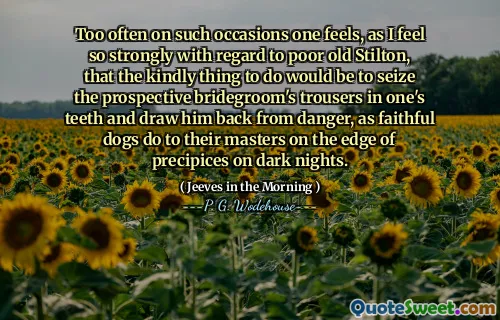It was one of those cases where you approve the broad, general principle of an idea but can't help being in a bit of a twitter at the prospect of putting it into practical effect. I explained this to Jeeves, and he said much the same thing had bothered Hamlet.
In "Jeeves in the Morning," the protagonist grapples with the challenge of translating a broadly appealing idea into a feasible reality. He finds himself uncertain about the practical implications of this idea, leading to a sense of unease. This internal conflict highlights the tension between aspirational thoughts and real-world execution.
The character shares his concerns with Jeeves, who offers an insightful comparison to Hamlet, suggesting that even great thinkers face similar dilemmas. This parallel underscores the timeless nature of such struggles and reflects Wodehouse's wit in exploring the complexities of human thought and action.

